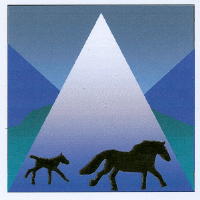Finding a Bit of Hope
/The Bybeck herd and its stewards and friends in 2005.
I am one of those Fell Pony stewards who believes that the breed’s characteristics have been shaped in part by living on the hills from which they take their name. So the upcoming dispersal of the Bybeck and a portion of the Greenholme Fell Pony herds came as disappointing news. These dispersals mean two more herds that have run on the fells of the breed’s native ground are leaving those fells. Tom Lloyd in a recent Fell Pony Podcast said that the sale of these herds represents a loss of 20% of the fell-running mares of our breed.
I learned several years ago about the precarious nature of Fell Ponies continuing to run on the fells. There are numerous reasons for this precariousness, but the most threatening is tremendous pressure from the conservation community to manage the fells differently than they have been managed in the past, which usually means the removal of domesticated animals for all or part of the year.
When I began to become aware of the precarious nature of Fell Ponies continuing to run on the fells, I queried a number of people in our community whose opinions I respect. Many of them seemed to think it is inevitable that there will come a day when Fell Ponies no longer will be seen on the uplands of Cumbria where they have run for centuries.
So when I heard the news about the Bybeck and Greenholme ponies, I was left with a feeling of sad inevitability. Then I heard a couple of interviews with members of The Fell Pony Society Council, and that feeling of sad inevitability grew. Even those people who voluntarily work on behalf of our breed and its society gave me no reason for hope that there is a future for Fell Ponies on their native fells. The reasons are complex and seemingly intractable and at least from my perspective are relatively local.
Since Libby Robinson’s return from France a few years ago, though, she has been working tirelessly for a brighter future for our breed on the fells. Her vision for a Fell Pony Heritage Centre in Cumbria and her advocacy for fell-running Fell Ponies have so far resulted in numerous newspaper articles and video appearances. To my eye at least, the Fell Pony’s visibility in its home region has grown thanks to Libby’s efforts and efforts that she has inspired in others. The Margaret Mead quote came to mind: “Never doubt that a small group of thoughtful, committed citizens can change the world; indeed, it's the only thing that ever has.”
My hopefulness for our breed’s future on its home ground has been kept alive by Libby’s efforts and similar ones from others. Then I ran across a story from Cumbria that sparked even a little more hope because, while not about Fell Ponies, it has many similar themes, including a national bureaucracy forcing decisions on local landscapes and citizens who had a different vision for their home terrain.
The story is in Robert Gambles’ book The Story of the Lakeland Dales in the chapter about the Duddon Valley. “Sixty years ago the quiet farmsteads of Black Hall and Cockley Beck were at the centre of a bitter controversy, with the Government on the one hand and the National Trust, the Friends of the Lake District and an influential section of public opinion on the other. In 1935 the Forestry Commission, already unpopular following the insensitive plantations in Thornthwaite and Ennerdale, acquired over seven thousand acres of the Muncaster Estate in the upper valleys of the Duddon and the Esk and proposed to establish there the Hardknott Forest Park. This nefarious plan to submerge these wild uplands under a sea of conifers led to a public outcry notable for its energy, eloquence and polemic and for its total condemnation of the scheme…. An Agreement in 1936 ended all further proposals for afforestation… The Lakeland landscape is no longer under threat from massive regiments of conifers but enriched by a diversity of tree species and a more sensitive approach to forest plantations.” (p. 75)
Victory did not come in a single decision, but the people of this place in Cumbria were successful in sustaining their landscape despite powerful outside forces. Perhaps the same will be true for Fell Ponies and their people, and I am thankful for the local efforts of Libby and other advocates on behalf of our ponies.
Libby has a fundraising campaign underway. If you are interested in supporting her work, click here.
© Jenifer Morrissey, 2021



